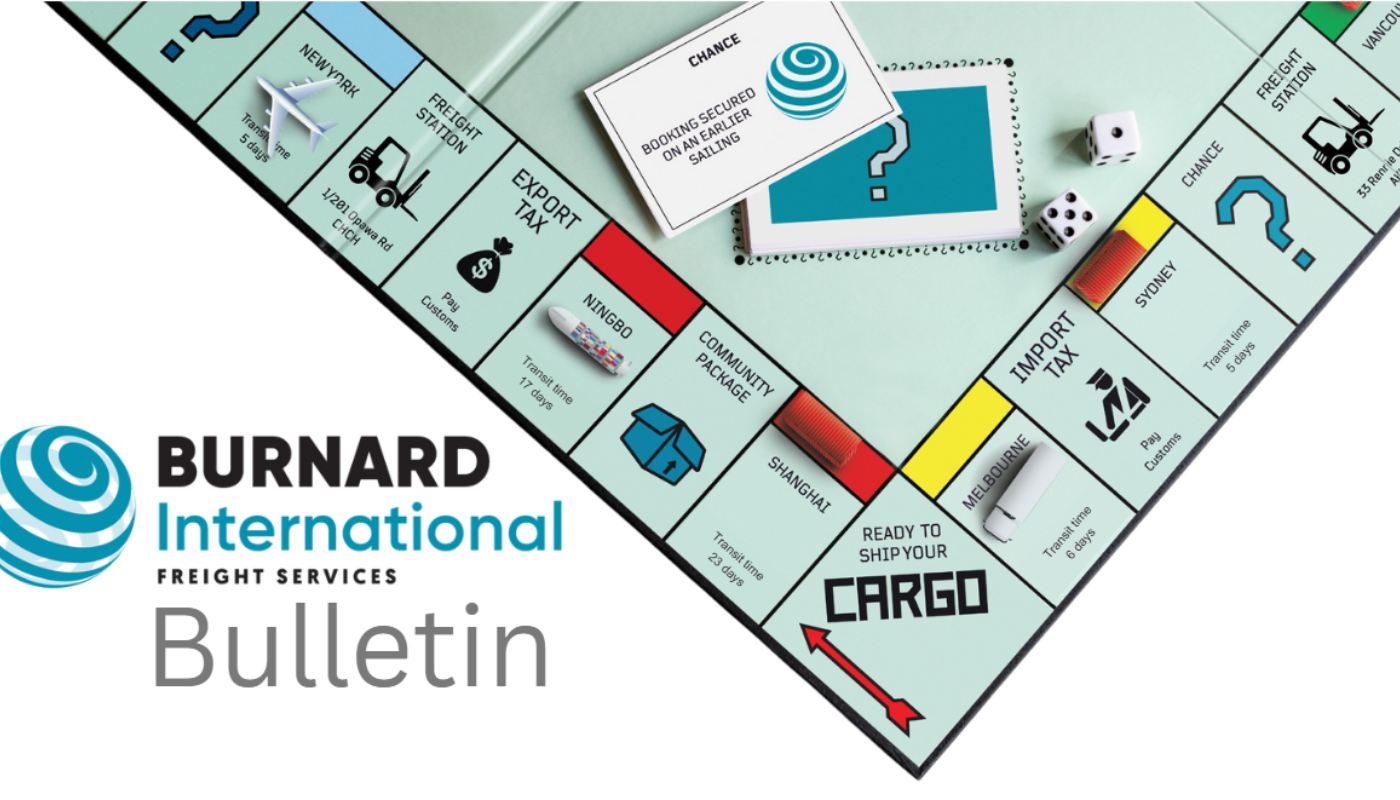|
- KiwiRail Line Closures. KiwiRail have confirmed line closures between Hamilton and Auckland from Saturday 20th September to Saturday 4th October. KiwiRail will be providing a road-bridging solution during this period.
- Get your Orders in Now for the Christmas Rush! The Christmas rush is kicking off already this year with reduced capacity on vessels due to the peak season. Coupled with reduced vessels calling New Zealand, now is the time to contact your suppliers to get those orders locked in and booked asap!
- Surprise Increase for New Zealand in US Tariffs Deadline. The Trump administration has announced an unanticipated increase in tariff levels for goods entering the United States from New Zealand. Previously set at 10%, the rate has now increased to 15%, placing additional pressure on New Zealand exporters. Additional higher tariffs will apply to autos and parts, steel, aluminium, copper and pharmaceutical goods.
- Removal of De Minimis Exemption on Goods Entering the US. From 29 August, suspension of the de minimis exemption will be removed from all countries, causing all courier goods and items under $800 entering the US to follow standard entry procedures.
- Export License Now Required by Suppliers in China. China have announced they are cracking down on suppliers needing an Export License.
- Peak Season Increases: Various notices from carriers for Peak Season Surcharge, GRI, Rate Restoration. Range is anywhere from USD25/TEU to USD350/TEU depending on the trade lane and shipping line. Please check with your Sales or Customer Care contact on how these increases may affect you (if applicable at all).
- Reminder: Brown Marmorated Stick Bug (BMSB) season kicks off 1st September. This requires screening for all Seafreight (LCL & FCL) from the “at risk” countries outlined by MPI. At risk goods must undergo treatment for BMSB where required PRIOR to departure. Please talk with your Customer Care contact at Burnard International for any clarification.
- Port Health Check:
We are now in the midst of peak season, with importers facing significant challenges in securing space on scheduled vessels. Many sailings are operating at full capacity, making advance bookings essential.
Adverse weather conditions and the ongoing typhoon season in Asia are contributing to delays, with vessels often required to anchor until conditions improve. These disruptions are creating a ripple effect of schedule delays across multiple ports. Combined with peak season demand, this is placing additional strain on the supply chain.
In Europe, seasonal holidays are contributing to slower response times and intermittent communication with suppliers, adding further complexity to logistics planning.
Exports from New Zealand remain relatively steady with bookings required for the usual 2-3 weeks in advance.
|
|
|

Photo Source: KiwiRail
KiwiRail has confirmed that line closures will impact rail freight services between Hamilton and Auckland from Saturday 20th September through to Saturday 4th October. These closures are necessary to support Auckland’s City Rail Link (CRL) programme, which is delivering essential rail network upgrades.
During this period, KiwiRail will implement a road-bridging solution.
- Dry containers will be road-bridged between Hamilton and Auckland MetroPort.
- Reefer containers will be road-bridged directly between Tauranga and Auckland MetroPort.
- Trains between Port of Tauranga and Hamilton will continue to operate as normal.
An additional block of line is also planned for the upcoming Labour weekend from Friday 24th October through to Monday 27th October.
|
|
Get your Orders in Now for the Christmas Rush!
|
|
|
We strongly encourage importers to secure space and have orders on the water as early as possible ahead of the Christmas period. Ongoing disruptions in the Red Sea continue to impact shipping, with vessels from Europe now taking an additional 1-2 weeks to reach New Zealand as they reroute around the base of Africa.
Compounding this are reduced vessel capacities and fewer services to New Zealand, making this a particularly challenging season for businesses that are not adequately prepared. We recommend confirming lead times directly with your suppliers and factoring in the likelihood of congestion at key transhipment ports en route to New Zealand.
|
|
Surprise Increase for New Zealand in US Tariffs Deadline.
|
|
|
The deadline for US President Trump’s latest round of tariffs passed on the 1st August. While some countries were successful in negotiating reduced tariff rates through enhanced collaboration and trade agreements with the United States, others—including New Zealand—have faced an unexpected increase.
New Zealand's tariff rate has risen from 10% to 15%, placing us at a competitive disadvantage when compared with similar countries, in-particular our closest neighbour and ally Australia, which has retained its 10% rate.
Trade Minister Todd McClay has raised concerns with the US Trade Representative, formally expressing New Zealand’s disappointment with the outcome. However, the prospect of a reduction appears unlikely to materialise at this stage.
Additionally, Trump has announced tariffs of 25% for autos and parts, 50% for steel and aluminium and 50% for copper.
Further increases are also in store for the pharmaceutical sector as Trump announced he would impart a “small tariff” on pharma goods before increasing to 150-250% within a maximum of 18 months.
|
|
Removal of De Minimis Exemption on Goods Entering the US.
|
|
|
From 29th August, the de minimis exemption into the US will be suspended. With the removal it will now require all imports, regardless of origin or value to be subject to applicable duties and tariffs.
All imports will now require full customs filings and compliance with all Partner Government Agency requirements.
Postal shipments will temporarily remain exempt from formal entry but will be subject to flat or ad valorem duties based on the country of origin.
In light of this, NZ Post have announced they have suspended some postal services to the US temporarily. Namely Economy, Economy Tracked, Economy Plus and Courier for both businesses and individuals.
However, it is still possible to send items via Express, and letters sent via Economy Letters service.
|
|
| Export License Now Required by Suppliers in China |
|
|
The Chinese Taxation Administration has announced stricter enforcement of export license regulations. Previously, suppliers without the necessary export license were able to ship goods by using the license of a local freight forwarding agent.
Effective 1st October, this practice will no longer be permitted. Customs authorities will begin verifying documentation with more scrutiny to ensure that suppliers present their own valid export license when customs clearing goods for export.
We strongly encourage you to contact your Chinese suppliers as soon as possible to confirm they hold the appropriate export license. This will help prevent disruptions to your supply chain and ensure you can still continue to purchase and receive goods from them after 1st October.
|
|

